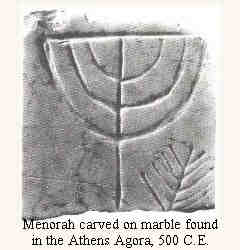 The rise and
decimation of the Greek Jewish Community
The rise and
decimation of the Greek Jewish Community
2000 years of Jewish Presence in Greece
The Jewish presence in Greece goes
back at least to the times of Alexander the Great king of Macedonia
. As a result of the Alexander's conquests
and subsequent Greek rule in Palestine, the Hebrew term "Javan"
as it appears in the Bible was generally translated by the rabbis
"Macedonia" (cf. Targum Pseudo-Jonathan to Gen. 10:2; Yoma 10a).
Although the origins of a Jewish community in Greece are unknown,
Strabo mentions in approximately 85 B.C.E. that Jews could be found in all
the cities of the eastern Mediterranean (VII 7 4). There may well have
been Jews, if not Jewish communities, living in Greek cities as far back
as the Babylonian Exile (586-530 B.C.E.). After the wars of the Maccabees,
between 170 and 161 B.C.E., many Hellenized Jews left Judaea and settled
in the new commercial centers, such as Alexandria and Antioch, of the
Hellenistic world. From these communities smaller groups moved to some of
the coastal Aegean cities such as Ephesus, Smyrna, Thessaloniki, and
Chalkis.
According to Jesephus ,
Kassandros who built Thessaloniki, asked King Ptolemei of Egypt to send him Jewish artisans
marking the beginning of Thessaloniki's Jewish community. It
is certain that such communities existed toward the end of the Second Temple
period . Philo, in the list of Jewish communities quoted from the
correspondence of Agrippa I to Caligula, refers also to the Jews of
Macedonia (The Embassy to Gaius, 281).
In any case, by the time
of the Apostle Paul there were flourishing Jewish communities in most of
the major Greek cities. The fact that Paul
and his followers made a number of journeys to Greece, and that their
doctrines were readily accepted there, tends to substantiate the existence
of a Jewish colony (cf. Acts 16:9; 18:5; 20:1; I Cor. 16:5; II Cor. 1:16;
2:13; 7:5).
The famous 12th century record
of the Jews of Greece compiled by Benjamin of Tudela during his travels
through Greece indicates a uniform dispersion of Jewish communities. The
Jewish community of Thebes was so closely identified with the silk
industry that Roger II of Sicily (1095-1154) forcibly moved almost the
entire community to Sicily to introduce the silk industry in his Norman
kingdom. The Jews of Greece during this period ( Byzantine) can be
described as “Romaniot” Jews, i.e. , Jews of the empire of the
“second Rome”.
A second wave of
Jewish immigration took place in 1492 when Ferdinand and Isabella
proclaimed the Edict of Expulsion for the Jews of Spain. By the third
quarter of the 15th century Greece as the rest of the Byzantine
provinces were under Ottoman rule. Ottoman policy toward
minorities was based on Islamic law, which recognized both Jews and
Christians as a separate millet (nation) with religious and - to an
extraordinary extent - legal autonomy within their own
communities. Over 20,000 Sephardim
or Iberian Jews arrived in
Thessaloniki the same year. Soon afterwards 36,000 Jews left Sicily, many
of them to settle in the Balkans.
Finally the last Jewish
immigration to Greece came from the north .After the Greek Independence
war the Bavarian King Otto I of Greece settled in Athens in 1834,
With him came a man named Max Rothschild, perhaps the first Jew to arrive
in the new capital. He was soon followed by a number of other Jews, most
of them Bavarian and therefore Ashkenazi in background. Within a
short period of time Jews from Turkey, many of them from Smyrna began to
settle mainly the city of Athens. By the middle of the 19th century
a small Jewish community had been well established in Athens.
Each new Jewish group brought
along its own traditions and attained different levels of
assimilation. Jews built international
trade and maintained close commercial ties with the families they had left
other parts of Europe and North Africa. Thessaloniki
at this period was,
according to the poet Samuek Ushkue, the "Metropolis"
of Israel,
city of Justice mother of Israel, like "Jerusalem".